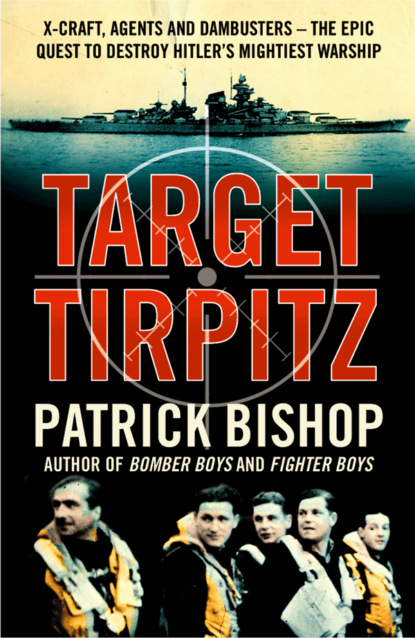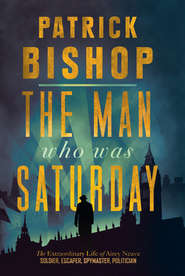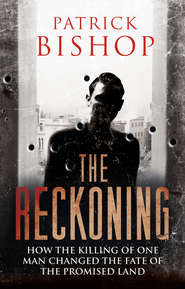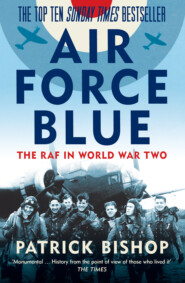По всем вопросам обращайтесь на: info@litportal.ru
(©) 2003-2024.
✖
Target Tirpitz: X-Craft, Agents and Dambusters - The Epic Quest to Destroy Hitler’s Mightiest Warship
Настройки чтения
Размер шрифта
Высота строк
Поля
Aerial still of RAF attacks on Tirpitz, 15 September 1944. (ww2images.com)
Group photo of Flight Officer C. H. Giersch, Flight Lieutenant Bruce A. Buckham, Flight Officer D. A. Nolan, Squadron Leader A. G. Williams, Flight Officer D. A. Daniell and Wing Commander James B. Tait. (AP/Press Association Images)
James Tait with pipe. (Courtesy Peter Tait)
Woodsman’s picture of the final attack through trees, November 1944. (Private collection)
Aerial photo of final attack taken from Flight Lieutenant Knights’ Lancaster. (ww2images.com)
Tait pictured with Cochrane at the Tirpitz celebrations. (Courtesy Peter Tait)
Capsized Tirpitz with bomb crater in foreground. (Popperfoto/Getty Images)
While every effort has been made to trace the owners of copyright material reproduced herein, the publishers would like to apologize for any omissions and would be pleased to incorporate missing acknowledgements in future editions.
Maps (#ub69b6a6f-d8c1-56bf-94b0-f6386eea5893)
Northern Waters (#litres_trial_promo)
The Northern Front (#litres_trial_promo)
Trondheim Area (#litres_trial_promo)
Loire Estuary and St Nazaire (#litres_trial_promo)
Convoy PQ.17 (#litres_trial_promo)
Operation Source (#litres_trial_promo)
The Battle of North Cape (#litres_trial_promo)
The Final Attack (#litres_trial_promo)
Ranks of the Kreigsmarine (#ulink_8abc8f3a-0917-520d-8ca9-f0d0bc075607)
Prologue (#ulink_70935bde-2a0e-53df-beee-efd46507b1fd)
The shortest memorandum in Winston Churchill’s vast wartime output of queries, instructions and exhortations is three words long. On Monday, 14 December 1942 he wrote to the First Sea Lord, Sir Dudley Pound, demanding: ‘Where is TIRPITZ?’ The reply was reassuring. She was stuck safely in a Norwegian fjord near Trondheim undergoing repairs. Far from getting ready for a potentially devastating sortie, the crew was busy decorating the messes in preparation for Christmas.
The terse tone of the memo reveals a tremor of alarm. Churchill’s manner, both real and contrived, radiated unflappability, even in the face of towering danger. Yet throughout her life this one battleship, the last of Hitler’s fleet, could disturb his calm, nagging at his thoughts when it might be imagined he had bigger concerns to worry about. His wish to see it sunk, or at least disabled, bordered on the obsessive. The archives contain a stream of calls for action addressed to admirals and air marshals. A note from Churchill’s office dated 22 January 1942 reports that ‘the Prime Minister rang up the First Sea Lord and instructed him to see tonight the Chief of the Air Staff and concert means for making an attack on the TIRPITZ’. It goes on to record his opinion ‘that the crippling of this ship would alter the entire face of the naval war and that the loss of 100 machines or 500 airmen would be well compensated for’.
In the cruel ledger of war, this, at the time, would have counted as a bargain. The destruction of no other enemy asset would absorb so many resources and so much time and energy. As long as Tirpitz was afloat she cast a shadow over British naval planning, mesmerizing the Home Fleet and forcing its most powerful ships to keep a constant watch against a breakout into the Atlantic where, in the anxious eyes of those watching her, she might cut Britain’s trans-atlantic lifeline.
Fear of her destructive power inspired a heroic feat of arms, the blowing up of the St Nazaire dock in March 1942, thus depriving the battleship of a haven should it ever make it into the Atlantic. It also triggered the shaming decision a few months later to abandon Convoy PQ.17 to its fate when it was thought that Tirpitz was at sea.
The effort to deal with her was unrelenting. Between October 1940 and November 1944 she was the target of twenty-four major air and sea operations. They ranged from conventional attacks by heavy bombers to innovative operations by human torpedoes and midget submarines that even in wartime seemed suicidally risky. Churchill’s proddings produced other even more hazardous and fanciful schemes that, mercifully, were never implemented.
Whether the prize was worth the cost is open to question. Churchill’s determination, though, ensured that it would be paid in full. The actions that followed produced one of the great dramas of the war, touching the limits of human courage and folly. This is it.
Chapter 1 The Belly of the Beast (#ulink_cf2a76f0-c4fc-5281-ae93-8b86fea1307e)
At 8.30 on the morning of 12 November 1944, the gun crews and lookouts on the decks of the battleship Tirpitz stood at their action stations staring intently into the eastern sky. It was a crisp, clear day. The sunlight sparkled on the waters of the Norwegian fjord in which they lay anchored, close to a small, humped island, smudged with the first snow of winter. A few minutes before there had been a clamour of bells and blaring loudspeakers as an air raid warning was announced.
Below deck in the gunnery fire control section a young midshipman called Alfred Zuba was reading a book on German history when the alarm was sounded. He put it aside and waited for information about the approaching aircraft to start crackling in the earphones clamped to his head. The first report placed the raiders less than twenty miles away to the south-east, flying at an estimated 9,000 feet. The details changed fast. The aircraft were closing rapidly. Like everyone on board, he knew what they were – Lancaster bombers, carrying big new bombs that exploded with the destructive power of an earthquake. Nonetheless, he felt confident. Tirpitz had seen off a similar attack a fortnight before and there was a squadron of fighter aircraft nearby to protect her. As yet, though, there was no sign that they were flying to the rescue. When the raiders were nearly thirteen miles away the ship opened fire on the attackers. The first salvo erupted from ‘Anton’ and ‘Bruno’, the forward turrets each housing two 15-inch guns hurling shells weighing almost a ton each with a force that made Tirpitz vibrate like a tuning fork.
Above decks, men were shouting and pointing excitedly at a cluster of small dots, black and ominous against the innocent blue of the sky. The heavy anti-aircraft guns and the light flak opened up and the stink of burnt powder filled the air.
Then, over the industrial thud of artillery and the clatter of cascading shell cases, a different noise was heard. A deep, elemental thunderclap rolled over the decks and echoed through the passageways and stairwells. It was followed by another. It seemed to Zuba that the great craft was ‘staggering’. She was being ‘shaken by giant fists’.
In an instant the atmosphere of quiet efficiency inside the steel walls of his battle station was swept away and everywhere was ‘disorder, confusion, mess, chaos – the bedlam of near and distant noises’. The deck below him began to tilt and he had to cling to a bulkhead to stop himself falling. He called the central flak control station but got only silence. Nearby, Oberleutnant zur See* (#ulink_46f4677a-bb70-583c-a8cd-5a0b57bdf925) Ludwig Mettegang, a twenty-three-year-old communications officer, was scrambling up the sloping floor to reach the emergency telephone that connected with the bridge. This line was still working. Mettegang demanded information and instructions, shouting to be heard over the din of explosions and the shriek of tortured metal. The thirty men around him, crouching in the gathering darkness as the lights flickered and died, watched and listened. They were on the lowest deck of the ship. To reach the outside world meant climbing through four levels up a succession of ladders. Mettegang turned to them with some dismaying news. The orders from the bridge were that they were to stay at their posts. Then came ‘new terrific hits, new gigantic shakings’. Mettegang was shouting ‘get out! Now!’
Zuba ‘tore the phones from my head. I took my gas mask and rushed to the emergency exit. Fifteen, twenty men were standing there. Everybody wants to go up, wants to get out – out to life, to escape from death! But there is only room for one at a time … so we are standing there and waiting for our turn.’
As he shuffled forward he could feel the ‘bottom burning under our feet’. Then it was his turn and he was ‘clambering through, along the pitch-dark narrow hold’ that led to the gun deck. As he reached the next hatchway the ship made another sickening lurch. He slid down the linoleum-covered floor, slippery with oil and water, away from the exit. Water was tumbling into the compartment, ‘black and oily’, reaching up to his chest. He felt ‘death take hold of me with iron hands’. He yelled for a lifebelt but no one could help. He scrabbled on the slick lino as ‘more and more water comes streaming in, holds me tight and does not let me go’. He could feel the shock of more explosions shaking the ship. At last he ‘found a handhold and pulled myself up. A comrade stretched out his hand to me so I could reach a ventilator [pipe].’ The respite was short. The ship slumped again. The pipe that had been upright was now horizontal and he was hanging above the water swirling below. The weight of his sodden clothes was dragging him down and he could ‘literally feel the strength draining out of my fingers’. Zuba had decided that ‘a few minutes then it will be over’ when the ship shifted again. His dangling feet found another pipe and he was standing upright once more. Someone was shouting that everyone should go back through the emergency exit. He could see the opening but to reach it he would have to leap six feet over the inky, freezing water. He braced to jump, knowing that, if he fell short, ‘death was waiting underneath … my knees were trembling’. In this fatal moment an absurd concern floated into his mind. Somewhere along the way he had lost his cap. He pushed the thought aside and jumped. Then he was hauling himself through the hatchway. There was a thud as another man landed behind him, missed his footing and slipped, leaving him hanging there with the water lapping at his feet. Zuba went back to help him. He recognized him, a seaman called Hegendorf. The ordeal was only beginning but Hegendorf had already had enough. ‘He was crying “Let me go, I must die.” “Don’t talk nonsense,” I answered. I pulled him out through the hatchway. He was very heavy. Then we closed the exit to stop the water.’
They climbed through the bowels of the ship, collecting other survivors on the way, until they reached a messroom. A young sub-lieutenant, Willi Völsing, the senior officer in the gunnery fire control section, took charge. He told Zuba and the others to stay put while he took a party off to search for a way out. They sat down to wait. At least they were out of the water and had air to breathe. Someone found a battery lamp which gave a little light. There was silence. They ‘tried to be calm. Nobody wanted to show what they were thinking about.’ The one exception was Hegendorf who was a ‘bundle of nerves’. Zuba tried to calm him down. He took no notice, only stopping when Völsing returned and warned him that he would shoot him if he did not shut up.
Völsing took Zuba aside ‘and said to me in a low voice, “It’s no use. We can’t get out. We’ve been searching everywhere.”’ For the benefit of the others though, the sub-lieutenant put on a brave face, announcing loudly: ‘“We’ll find some way out. I won’t abandon this fight.”’ Now Zuba took over the search. He and his team found their way into the A Deck radio room where there were more survivors whom he led back to join the others. During their search they had found another lamp, and some dry clothes. Zuba stripped off his uniform and put on white underpants, green trousers and a blue mechanic’s jacket, which made him look ‘like a comic actor’. They had also found bread, coffee, cognac, sweets and a large box of cigarettes.
For a while their fear lifted and their spirits rose. ‘Suddenly someone said, “Good Lord, today is my birthday.” We all congratulated him.’ It seemed to Zuba, though, that many were thinking ‘let us hope your birthday is not your death day as well’. The ‘birthday boy was allowed to take the first big swig. Then it was the turn of the others.’
They sat, warmed by the cognac, chewing coffee beans. One of the wireless operators, ‘a regular brick, calmness itself’, gave an optimistic assessment of their situation. He was sure that everything was being done to save them – they would have to be patient until the cutting gear arrived. The ship was 118 feet wide and the water she lay in was shallow. Now that she had turned turtle, ‘there is always going to be a bit sticking out of the water’.
Soon afterwards the wireless operator’s prediction seemed about to come true. Zuba heard ‘a knocking somewhere – bang, bang, bang’. Someone seized a fire extinguisher and began knocking back, but the noises got weaker and faded away. Their spirits slumped again. They sat in the cold metal box, each alone with his thoughts. Zuba worried how his mother would take the news of his death. His brother had been killed a year and three days before on the Eastern Front. What would the effect be on his fiancée Ruth who, when he had told her that he was being posted to Tirpitz, ‘was glad because she thought that being on a battleship was safer’?
Someone blurted out, ‘“If I get out of here I will get married at once.” Now they all start saying what they intend to do if they get out.’ While the others gabbled, though, hope was ebbing from Zuba. He could hear the rush of water. Then one of the radio operators noticed it, too. He began asking ‘again and again, “is the water rising?”’ The others told him to shut up. They sat sunk in silence. Then, over the sinister gurgling, they heard men calling out.
They shouted back together, ‘where are you?’. A chorus of voices came back but the reply was indistinct. The yelling continued. Finally they understood what they were saying. Their unseen comrades were trapped in Switch Room 3. Zuba and his companions shouted back that they were in the forward mess, but there was no answering call. They sank back into silence.
Then, someone thought they heard other voices, and a sharp hissing noise. It sounded, he said, like gas from an oxyacetylene torch. To Zuba, though, it seemed more likely to be the rustle of invading water. Others, though, seized on this rope end of hope. A leading seaman took the fire extinguisher and smashed through the compartment wall nearest to where the noise was coming from, only to be faced with a slab of thick steel. Zuba could hear the hissing more clearly now. It was stopping and starting. He began to think that ‘it could come from cutting apparatus … again there is hissing, crackling and banging’.
They started yelling again, ‘shouting “hurry up, the water is rising”’. Their room was still dry but they could see the compartment below them filling up. Zuba felt they were ‘in a running race with death’. The torch noises were getting closer, though. Someone ‘puts his hand on the steel wall. It is quite warm. “Hurry!” we shout.’
Then, a molten red spot appeared on the wall, followed by a shower of sparks. They shouted with joy ‘like little boys’, as the glowing line crept along the wall. They were ‘staring at it, drinking in every centimetre of its growth’, when ‘suddenly the hissing stopped. We heard voices moving away. There was a deathly silence around us.’
The last berth
The captives shouted in dismay. They screamed and banged on the cold steel walls of their prison, but ‘there is no answer, only the echo of our desperate shouting’. In the darkness below they could make out a ‘mirror of black gleaming water’ rising towards them.
Just as despair settled over him, Zuba heard more banging and sparks sprayed from the wall. A molten spot reappeared and slowly traced a glowing rectangle. There was a clang of falling metal and faces appeared in the hole. Their saviours looked ‘as if they had come from another world’. The hole was only sixteen inches wide. Each man had to be pushed and pulled through it. They emerged into another space with a ladder leading upwards. When Zuba reached the top he saw a square in the metal above him and, through it, the sky. It was evening. The stars ‘were twinkling, a sight I will never forget.’ He climbed up, and out into freezing night, ‘standing free and saved and sucking … air into my lungs’.
He was standing on a vast expanse of red-leaded metal. It took him a moment to realize it was the hull of the ship. As he was led away a soldier told him why the rescue had been broken off. Working in the cramped space between the hull and the lower deck, the welders had started to pass out from lack of oxygen. The twenty survivors were put on a launch and taken off to another ship, where they were fed and bathed and clothed. Zuba was anxious to know the fate of the men he was with when the ship began to topple. Leutnant Mettegang was still missing, believed trapped with twenty-four men. Next day, when Zuba asked again for news, he was told they were dead. According to the story that went around, the rescue team had been able to hear the trapped men but not to reach them. They had been singing ‘Deutschland, Deutschland, Über Alles’ before they suffocated.
* (#ulink_a1f8809b-302e-50b5-a444-074076395f80) See Ranks of the Kriegsmarine, p. xix, for equivalent British rank.
Chapter 2 Wilhelmshaven, Saturday, 1 April 1939 (#ulink_b349041f-d237-5d5c-ab76-68c542af0551)
Adolf Hitler descended from a Mercedes limousine and strode along the dockside beneath the slipway supporting the gigantic hull. His face wore an expression of childish delight as he looked up at the soaring flank of his new battleship, then turned to salute the crowds packed in thousands in orderly squares alongside. They had been brought in from all over Germany’s ever-expanding territories to provide the numbers needed for a theatrical display of might and played their part enthusiastically, cheering, waving swastika pennants, pressing forward for a glimpse of the leader as he strode past.











